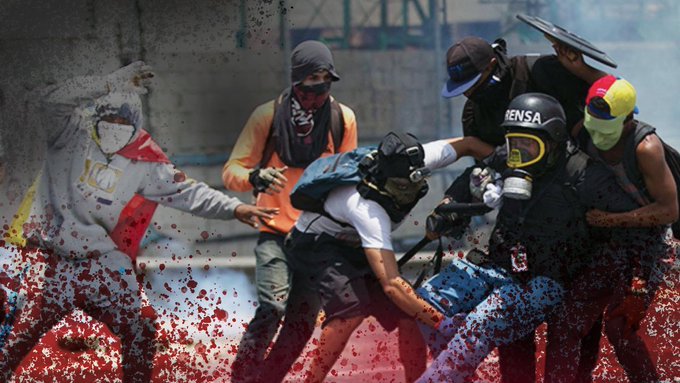United Nations High Commissioner for Human Rights, Michelle Bachelet, arrived on Wednesday 19 July to Venezuela for a 3-day visit. On Thursday afternoon, the High Commissioner, human rights organizations and multiple victim groups met. In this space of one hour, 26 spokesmen were able to make requests to the High Commissioner. 20 of these interventions are registered in this document, which represents an overview of the activists’ demands for the human dignity of the country in a context characterized by the lack of democracy, increase in poverty and forced migration.
Below is one of such interventions.
The process of demarcation and securitization of communal land has stagnated for the past three years. In violation of the National Constitution, to this date the state owes 85% to indigenous ownership.
In Venezuela there are no prior consultation processes, nor free and informed prior consent. The State uses the fulfillment of pre-established conventions, with pre-determined objectives, controlled participation, that determines indigenous involvement with mega mining projects, uses of land and productive activities, especially within the boundaries of the Orinoco Mining Belt, falsely qualifying them as Prior Consultation.
At a national level, clinics, hospitals and health centres in indigenous territories can be found in considerable deterioration, with a lack of medicines, electricity, clean water, transportation, fuel, a pattern that repeats itself in each one of the establishments. In addition, abandonment, disease and deaths are not reported, especially in remote areas. In 2018, a measles epidemic was detected in indigenous territories, leaving 37 dead in Delta Amacuro, 27 in Amazonas and 3 in Bolivar. Cases of whooping cough, intestinal parasitosis, chickenpox, conjunctivitis, diarrhoea, vomit, and skin ailments were reported. Malaria has been classified as an epidemic by OPS/OMS (PAHO/WHO) especially in the states of Bolivar, Amazonas and Delta Amacuro, ancestral lands affected by illegal mining.
The indigenous in Venezuela are migrating because of hunger. The increase in malnutrition and lack of food has generated an internal indigenous displacement to cities and to mining areas to work in modern slavery conditions, being the principal victims of human trafficking, prostitution and exploitation. In turn, it has forcibly displaced indigenous Eñepa, Yukpas, Wayuu, Añu, Waraos and Pemon to Colombia, Guyana, Trinidad and Tobago, and Brasil. In 2018, 800 Waraos and Eñepa Indians were found in 2 settlements in Brazil, and 400 Yukpa Indians in Cucuta, Colombia.
The presence of armed delinquent groups, unions, Colombian guerrilla, Ejército de Liberación Nacional (National Liberation Army) and Fuerzas Armadas Revolucionarias de Colombia, FARC (Revolutionary Armed Forces of Colombia), for “cleaning” efforts for controlled management of illegal mining and the deterritorialization in collusion with the State and the Fuerza Armada Nacional Bolivariana (Bolivarian Armed Forces) have militarized and turned the indigenous territories into zones of conflict and violence in Delta Amacuro, Zulia, Apure, Monagas, Bolívar and Amazonas, forcing the indigenous communities to migrate and submit to norms and rules imposed by those groups, to illegal mining, things that affects their way of life and deterritorialization; fearmongering; devastation of their territories, this being the main reason for the armed presence in the areas, indigenous people on the verge disappearance as we know them, losing in many cases the ancestrality that they had protected and conserved.
As a result of the Africanization of mining in indigenous territories in the Orinoco Mining Belt, indigenous people in Bolivar and Amazonas. Between 2017 and 2018, CODHECIU systematized 17 massacres of non-indigenous consequences of the AMO and PROVEA confirmed the rise of conflict in indigenous territories: the kidnapping, torture and threats to the community, its chief and his family in the San Luis de Morichal community, 5 murders of indigenous people by agents of the state and paramilitary groups; 4 murders committed between indigenous people related to mining conflicts; the increasing incorporation of indigenous people to illegal mining labour pushed by the humanitarian crisis, the threats and the rise of violence in indigenous territories. Ultimately, the harassment against the indigenous Pemon mayor of Gran Sabana, Emilio Gonzales, his activists, his social and indigenous leaders presently persecuted and refuged in Roraima, Brasil. The gold, diamonds, coltan and minerals of the AMO are the product of conflict and bloodshed.
The rise of the quantity of indigenous leaders, environmental defenders and activist that have been threatened for opposing, criticising, protesting and denouncing governmental policies, the extractive mining projects, the presence of irregulars and militarization, is very serious, forcing them to flee from their land.
Request
Nicolas Maduro must halt the Orinoco Mining Belt Project, that until now has not fulfilled its constitutional obligations, in terms of environmental, indigenous and participation rights.
There must be culturally appropriate prioritized attention to respond to the Complex Humanitarian Crisis in indigenous territories, especially in remote areas in matters of nutrition, health, clean water, electricity and fuel, especially for kids, teens, women and elders.
Reinitie the process of demarcation of indigenous territories and the creation of rules for the community with participation and approval of the communities and indigenous people through free and previously informed consult and consent processes.
Cessation of the process of co-optation, blackmailing, threats, criminalization and harassment against indigenous communities and leaders that defend their land, environment and culture.




